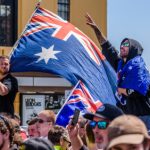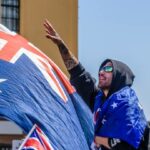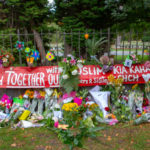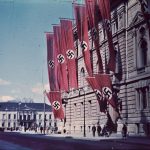US Votes Against UN Adopted Anti-Nazi Resolution, While Australia Abstains

The 76th session of the UN General Assembly last week adopted a resolution on “combating glorification of Nazism, neo-Nazism and other practices that contribute to fuelling contemporary forms of racism, racial discrimination, xenophobia and related intolerance”.
Initiated by the Russian Federation, the resolution saw 130 nations vote in favour of curbing a global rise in neo-Nazism on 16 December.
But two countries notably voted against it – the US and the Ukraine – while 49 others abstained, with one of those being Australia.
Russian Ministry of Foreign Affairs special representative Grigory Lukiantsev explained in November that since a similar resolution was passed last year, not only do the issues remain unresolved, but “racist and xenophobic rhetoric” has worsened against the backdrop of the COVID-19 pandemic.
However, US permanent mission to the UN representative Nicolas Hill last month explained that while his nation condemns Nazism, it was voting against the resolution as it impinges upon the US First Amendment protection of the right to freedom of expression.
Moscow has long condemned Ukraine and the Baltic States for permitting the glorification of Nazism, while Washington claims this is a Russian disinformation campaign, which the resolution propagates. And the vote occurred as tensions between the two nations are rising over the Ukraine.
Rising neo-Nazism
The adoption of resolution A/76/460 DR 1 holds special significance, as it’s been 75 years since the Nuremberg Tribunal recognised the criminality of the Nazi SS organisation, including the Waffen SS. And the document recognises that Nazi atrocities helped lead to the creation of the UN.
“Neo-Nazism is more than just the glorification of a past movement, it is a contemporary phenomenon with strong vested interests in racial inequality and an investment in gaining broad support for its false claims of racial superiority,” the resolution notes.
According to the document, there has been a rise in extremist political parties and ideologies in many parts of the world, and even where these groups don’t formally participate in government, their presence helps shift political discourse to the right.
The resolution further raises serious concerns around these forces recruiting susceptible individuals, including children, over the internet, and that there has been a rise in racist and xenophobic rhetoric and violence perpetrated by these groups, which include skinheads.
And the document goes on to recommend that states adopt national action plans to curb racism, specifically neo-Nazism. And it further suggests nations legislate measures in line with articles 4 and 5 of the UN International Convention on the Elimination of All Forms of Racial Discrimination.
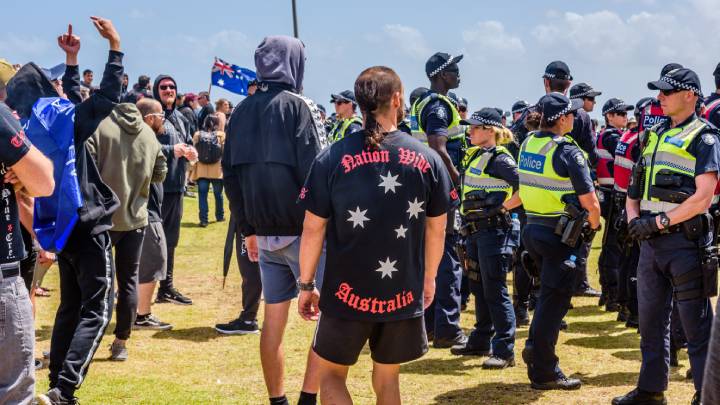
“It’s OK to be white”
It’s disappointing that Australia abstained from supporting a ban on the glorification of all things Nazi, although it’s not too surprising as our nation tends to side with the US on divisive matters, and our government has also been resistant in condemning the far-right domestically.
Following Israeli forces having shot and killed 58 unarmed Palestinian protesters along the Gaza Strip border on a single day in May 2018, Australia and the US were the only nations to vote against a UN Human Rights Council proposal to set up an independent investigation into the matter.
While despite a clear uptick in far-right groups operating in this country, the Coalition government has been most reluctant to list any such entities as proscribed terrorist groups, even following an Australian white supremacist having gunned down 51 Muslims worshippers in Christchurch in 2018.
During an October 2020 senate estimates hearing, ASIO director general Mike Burgess noted that right-wing extremism is an “evolving threat”, which now constitutes about 30 to 40 percent of his domestic intelligence agency’s surveillance work.
The top spy said COVID-19 feeds into the “narratives and conspiracies” core to the ideologies of these groups.
“They see the pandemic as proof of the failure of globalisation, multiculturalism and democracy, and confirmation that societal collapse and a ‘race war’ are inevitable,” he added.
Yet, federal parliament has a number of members who make no secret of their support for far-right groups, such as One Nation Senator Pauline Hanson and Liberal Nationals MP George Christensen.
Indeed, all Coalition senators initially supported a Hanson introduced white supremacist-inspired motion that proclaimed it’s “It’s OK to Be White”, which was put to the chamber in 2018. The government then went into damage control following public outrage over the incident.
A proposed ban on Nazi symbolism
Despite the Morrison government abstaining from the UN resolution, NSW shadow counterterrorism minister Walt Secord had already tabled a bill before state parliament in October that happens to abide by the recommendations set out in the Russian-initiated document.
The Crimes Amendment (Display of Nazi Symbols) Bill 2021 proposes the creation of a new offence that would prohibit the public display of all forms of Nazi insignia, in recognition that when these symbols are on show they’re designed to intimidate.
Secord drafted the bill following the acquisition of a NSW Attorney General’s Department report, which found that over the two years to April 2020, 31 incidents of Nazi flags or symbols being publicly displayed in this state had been reported to authorities.
This legislation was tabled in parliament at a time when the antilockdown Freedom movement has been on the rise nationwide. And while not all attending its demonstrations are proponents of far-right ideologies, its rallies have been marked by a strong presence of those who are.

The right to be a bigot
The combating glorification of Nazism resolution stresses that “the purpose of addressing hate speech is not to limit or prohibit freedom of speech, but to prevent incitement to discrimination and violence”.
Yet, the federal Liberals and Nationals have long been attempting to wind back laws that prohibit discriminatory speech and expression.
In 2017, the Turnbull government unsuccessfully attempted to water down the protections against racism set out in section 18C of the Racial Discrimination Act 1975 (Cth).
And more recently, the Morrison government has introduced its Religious Discrimination Bill 2021, which includes a law providing that statements of belief currently outlawed as discrimination would be legal when these statements are made in accordance with one’s faith doctrine.
In doing so, Morrison’s bill specifically lists all pieces of state, territory and federal antidiscrimination legislation going back to the 1970s that statements of belief would override.
These include protections against discrimination based on sex, sexual orientation, gender identity, marital or relationship status, pregnancy potential, disability, age, HIV status and racism.



